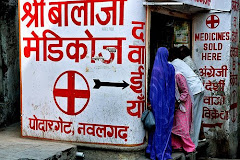I attended the Graduate seminar ‘Pioneering Urban
Missions’ led superbly by Dr Varghese Philip at the EMFI National Conference 2012 and thought I would share a few
reflections after the interesting discussions that we had.
The focus of the seminar was to hear from a variety of
people who had found themselves practicing medicine in the urban setting and
for us as a group to open our minds to the possibilities of serving God in
India, not just in the traditional ‘mission setting’ in remote rural areas but
to be a blessing wherever God has placed us.
"Does God only care for those people in rural
areas?" The answer: "Of course not", but have we as a
medical profession in the past concentrated more exclusively on rural areas,
because the needs are so great, and perhaps become somewhat closed to the needs
in urban areas? Have we in our own hearts, thought or decided that the rural
areas were more important to God than the urban areas? I confess that at times,
having a strong call to seeing access to health come to rural areas, I have
been guilty of wondering why we as doctors were not all so concerned and
rushing out to serve the poor in rural India... God has challenged me sharply
on this!
Those speaking had a wealth of experience to share with
us, from working in urban slums through church community development programs
to working in their own private practices, and as they spoke it was amazing to
see the influence they were having in seeing God’s Kingdom extended through
being the hands and feet of Jesus.
It struck me afresh that God is working right now, in
all areas and all sectors of society in India, and we will be called and
placed exactly in the right position by God, ‘for such a time as this’. Some
will be called to the huge medical needs in rural areas where health care
access is woefully absent, but at the same time, some will be called to the
urban areas. In urban areas there are vast pockets of material poverty and
marginalisation, but at the same time imagine the influence and impact that
ethical medical private or government practice in urban areas could bring as
influencers of our cities, maybe people in high positions, visit for medical
care and find something more, finding Jesus’ values in that place. What a light
in the city that could have far-reaching effects for the nation of India.
I qualified as a doctor 11 years ago [not sure if that
classifies me into a young or middle aged doctor - perhaps depends on the
reader?!], but as we delved into ‘missions issues’ in this seminar then it
seemed to be that the new generation of doctors, either working now or coming
up as students will bring with them a new wave of practicing medicine in a
contemporary way for their own generation. New innovative ideas, understanding
the differing cultural issues coming with a more modern and changing India, and it excited me to see God at
work through different types of practice.
In the discussion time, different people were bringing
up issues that I felt were relevant to us all as doctors in India today. I will just paraphrase a
couple of the main issues discussed here:
“Did working in private practice in an urban area mean
we were less devoted to God or not seen as ‘extreme’ a christian as someone who
has served on the rural mission field sacrificially for the past 40
years?”
“Can you be a ‘missionary’ outside of a mission hospital
setting?”
These were genuine concerns of those in the room, some
poeple felt guilty that they were not able to serve in rural areas, and how
refreshing to hear the honesty of those asking and answering the questions.
As I personally reflected on these important points I
began thinking about the term ‘missionary’ and whether this is still a helpful
term in our generation?” Perhaps I am making a controversial point here, but
somehow I felt that using the term ‘missionary’, as well as having great
meaning behind it, can potentially generate some negative connotations to the
listener. If you are not a follower of Jesus, does ‘missionary’ generate
unwelcome thoughts that the missionary doctor is here to forcibly convert or
impose views onto them rather than genuinely deliver compassionate health care?
Does the word ‘missionary’ strike fear into some of the hearts of those
christian doctors who are not called to work in remote rural areas and
therefore feel somehow that they have failed for God?
So as I summarise, the challenge for us all is to to
simply be the ‘hands and feet of Jesus’, wherever He has placed us to be. Let
us have flexible, creative minds to be open to how God can use each one of us,
whether in rural or urban areas, and lets shine a light into every sector of
society. Rather than being known as a ‘missionary’... perhaps we could
simply be known as doctors in India who love the Lord and want to
see the gospel demonstrated through our actions, with integrity, love and
compassion to all we meet.
Dr Mary Cusack - paediatrics

 3. Coming in the likeness of man This was no avatar - a form that can be cast off
later for another form - our Lord Jesus has become permanently human! Jesus -
God eternal becomes a flesh and blood man - and continues to be one while
keeping His eternal divine nature as well! Oh glory!
3. Coming in the likeness of man This was no avatar - a form that can be cast off
later for another form - our Lord Jesus has become permanently human! Jesus -
God eternal becomes a flesh and blood man - and continues to be one while
keeping His eternal divine nature as well! Oh glory! 7. Even death on a cross The death Jesus suffered was the worst possible, the
most shameful and painful way of dying. Only the wounds of God can speak to our
wounds - and overcome the wicked mess we have made of things.
7. Even death on a cross The death Jesus suffered was the worst possible, the
most shameful and painful way of dying. Only the wounds of God can speak to our
wounds - and overcome the wicked mess we have made of things.












